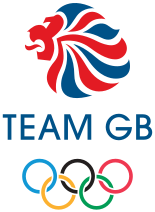 | |||
| Nickname(s) | Team GB | ||
|---|---|---|---|
| Association | The Football Association (since 1907) | ||
| Most caps | Jim Lewis Mike Pinner (11)[1] | ||
| Top scorer | Will Campbell (10)[1] | ||
| FIFA code | GBR | ||
| |||
| First international | |||
(London, Great Britain; 20 October 1908) | |||
| Biggest win | |||
(London, Great Britain; 20 October 1908) | |||
| Biggest defeat | |||
(Melbourne, Australia; 30 November 1956) (Sofia, Bulgaria; 5 May 1971) | |||
| Olympic Games | |||
| Appearances | 8[2] (first in 1900) | ||
| Best result | Gold: 1900,[2]1908,[2] 1912[2] | ||
Medal record | |||
The Great Britain Olympic football team is the men's football team that represents the United Kingdom at the Summer Olympic Games (where it competed as Great Britain, branded Team GB). The team is organised by the Football Association as the men's footballing representative of the British Olympic Association. The team only competes in the Olympic Games. In other international football tournaments, the Home Nations of the United Kingdom are represented by their own national teams, a situation which pre-dated the establishment of a GB team.
The team first competed at the FA organised tournament for the 1908 Olympics held in London, which was the first games that featured representative teams using players selected nationally (prior games in 1900 and 1904 used club teams). This team and the two that followed in 1912 and 1920 featured only English amateur players, and is seen by some as merely an extension of the English amateur team, set up in 1906 in response to the rise of the professional game.[3] In this period the team won the gold medal at the 1908 and 1912 tournaments, although exited at Round 1 in 1920. A dispute between the FA and FIFA over the inclusion of professionals saw the FA withdraw from Olympic football in 1924 and 1928, and saw no football at the Olympics at all in 1932.[1]
After the creation of the FIFA World Cup, it was agreed that Olympic football would become exclusively amateur,[4] leading to the team competing again in the 1936 Games, this time incorporating players from other Home Nations. After the break caused by World War II, the team then competed in every games from 1948 until 1972, albeit failing to qualify for the main tournament after 1960.[1] In this period the team's best performance was fourth place in 1948 at the second Games hosted in London, under manager Matt Busby.[1]
After the FA abolished the distinction between amateur and professional players in 1974, it stopped entering a team.[3] By the 1992 Games teams could use professionals, but were restricted to players under 23 years old, with only three over-age players allowed per squad.[4] Despite this change, Great Britain did not enter a football team again until London won the right to host the 2012 Games.[5][6] The FA organised the team, with Stuart Pearce appointed manager.[7]
A Great Britain women's team also competed at the 2012 and 2020 Games, following the introduction of women's football to the Games in 1996.
- ^ a b c d e Menary, Steve (2010). GB United? British Olympic Football and the End of the Amateur Dream. Durington: Gardners Books. ISBN 978-1-905411-92-4.
- ^ a b c d e In some years, notably 1908, 1912 and 1956, the Great Britain Olympic team was the England national amateur football team playing in the colours of the United Kingdom. Sources differ as to whether this team should be considered a GB team or an England national team
- ^ a b Beck, Peter J. (1999). Scoring for Britain. Routledge. p. 56. ISBN 9780714648996.
- ^ a b "Olympic Football Tournament (men)" (PDF). FIFA. Archived from the original (PDF) on 31 March 2010. Retrieved 1 February 2012.
- ^ "GB football team to enter Games". BBC Sport. 30 September 2006. Archived from the original on 16 March 2007. Retrieved 10 March 2010.
- ^ Cite error: The named reference
compromisewas invoked but never defined (see the help page). - ^ "Stuart Pearce and Hope Powell to lead GB Olympic teams". BBC Sport. 20 October 2011. Retrieved 20 October 2011.